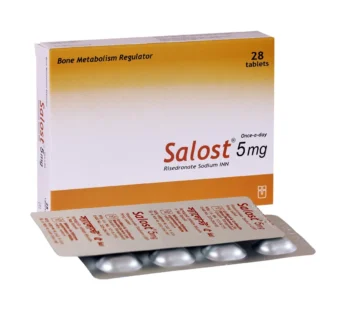Description
Indications:
This medication is indicated as an adjunct to diet and exercise for improving glycemic control in adults with type 2 diabetes mellitus when treatment with both sitagliptin and metformin is appropriate.
Important limitations of use:
This medication should not be used in patients with type 1 diabetes or for the treatment of diabetic ketoacidosis, as it would not be effective in these conditions.
Consult a registered healthcare professional before using this medication.
Pharmacology:
This tablet combines two antihyperglycemic agents with complementary mechanisms of action to improve glycemic control in patients with type 2 diabetes.
- Sitagliptin, a DPP-4 inhibitor, works by slowing the inactivation of incretin hormones, such as GLP-1 and GIP, which increase insulin secretion and decrease glucagon levels in a glucose-dependent manner.
- Metformin HCl, a biguanide, reduces hepatic glucose production, decreases intestinal glucose absorption, and increases peripheral glucose uptake.
Dosage & Administration:
The dosage should be individualized based on the patient’s current regimen, effectiveness, and tolerability, without exceeding the maximum recommended daily dose of 100 mg sitagliptin and 2000 mg metformin.
- Initial dose: For patients not currently on metformin, start with 50 mg sitagliptin/500 mg metformin hydrochloride twice daily, with gradual dose escalation.
- For patients already on metformin: Start with 50 mg sitagliptin/1000 mg metformin hydrochloride twice daily.
- Extended-release version: Administer once daily with a meal, preferably in the evening.
Special Note: For patients taking insulin or an insulin secretagogue (e.g., sulfonylurea), the dose may need to be lowered to reduce the risk of hypoglycemia.
Consult a registered healthcare professional before using this medication.
Interaction:
- Cationic drugs: Use with caution when taken with cationic drugs eliminated by renal tubular secretion.
- Phenprocoumon: Metformin may decrease the anticoagulant effect of phenprocoumon, requiring close monitoring of INR.
- Levothyroxine: Levothyroxine can reduce the hypoglycemic effect of metformin, requiring glucose monitoring.
Contraindications:
This tablet is contraindicated in patients with:
- Renal disease or dysfunction (creatinine levels ≥1.5 mg/dL for males, ≥1.4 mg/dL for females).
- Acute or chronic metabolic acidosis, including diabetic ketoacidosis.
- History of hypersensitivity reactions (e.g., anaphylaxis or angioedema) to this tablet or its components.
Side Effects:
Common side effects reported in ≥5% of patients:
- Diarrhea, upper respiratory tract infection, and headache.
- Hypoglycemia when combined with insulin or sulfonylurea.
- Nausea/vomiting, flatulence, abdominal discomfort, fatigue, and headache due to metformin.
Pregnancy & Lactation:
- Pregnancy Category B: No well-controlled studies are available in pregnant women. Use only if necessary.
- Lactation: It is unknown whether sitagliptin is excreted in human milk, so caution is advised when administering to nursing women.
Precautions & Warnings:
- Lactic acidosis risk due to metformin accumulation, especially in patients with kidney, liver issues, dehydration, or alcohol use.
- Regular monitoring of thyroid-stimulating hormone (TSH) and vitamin B12 levels is recommended.
- Renal function should be assessed before initiating treatment and annually thereafter.
- Acute pancreatitis has been reported; discontinue if suspected.
- Avoid excessive alcohol intake and consider using insulin during periods of stress, infection, or surgery.
Overdose Effects:
- Sitagliptin: In case of overdose, employ supportive measures, and consider hemodialysis if necessary.
- Metformin hydrochloride: Overdose may lead to pancreatitis; hemodialysis is effective in clearing the drug.
Therapeutic Class:
Combination oral hypoglycemic preparations.
Storage Conditions:
Store below 25°C in a dry place, away from light. Keep out of reach of children. Do not use after the expiration date.









Reviews
There are no reviews yet.